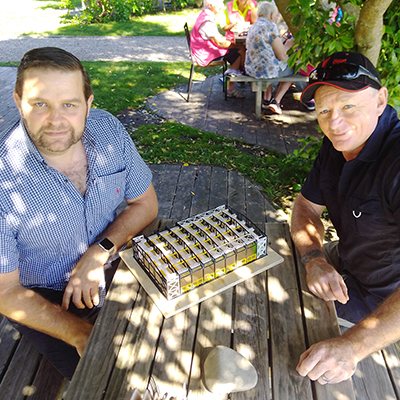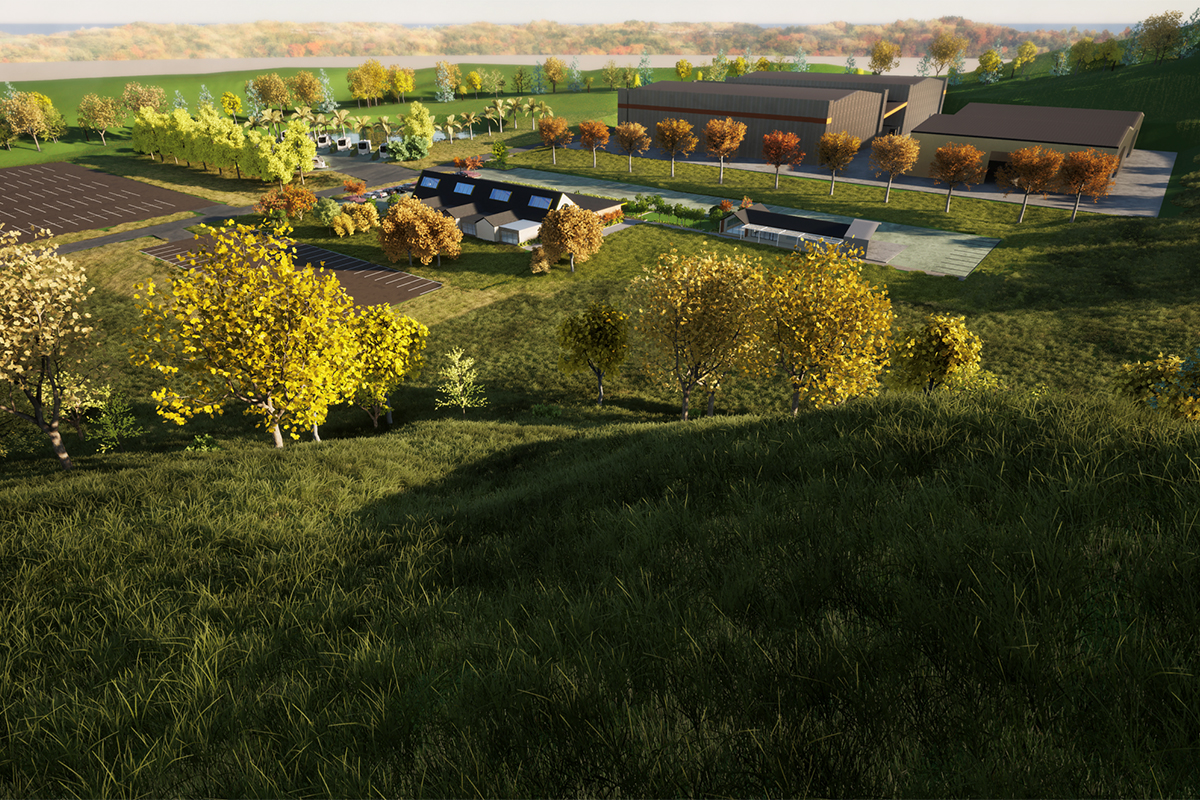Parkhill Studios nearing green light.
Film could soon be part of Hawke’s Bay’s regional branding once a massive state-of-the art movie studio in the scenic hills behind Te Awanga opens its doors to international productions from late 2022.
BayBuzz can confirm a purpose-built studio, likely to cost up to $60 million, is going through the final consenting stages with the view of attracting a pent-up demand from overseas film production companies to come to New Zealand.
Unless unforeseen obstacles intervene, Parkhill Studios will be one of two new production facilities championed by industry entrepreneurs Tony Keddy and his brother-in-law Havelock North-based Derek Slade to bolster New Zealand’s international movie production capacity. The second smaller studio will be in Rangiora, Christchurch.

The two are directors of a separate but associated business, Penrose-based Grip HQ, which provides on-location technical, electronic and mechanical muscle and skills including cameras, trolleys, rigging equipment and grip services and operators for the film industry.
Credit for their involvement appears near the end of the credits in movies including The Hobbit and Lord of the Rings trilogies, King Kong, Avatar, Mission Impossible MI6, The Lovely Bones and many others.
Parkhill Studios will be situated in a valley above the Clifton Cricket Club on 2.2 ha of land adjoining the Maraetotara River and near lakes on the Nillson family farm behind Te Awanga which has been leased for 35 years.
The facilities include two parallel 60 x 40 metre architecturally designed structures with state of the art 20cm thick soundproof panelling produced at the Bondor factory in Palmerston North.
Purpose-built facilities
Parkhill Studios and its partners are hoping the purpose-built studio with internal gantries will set the tone for future production facilities worldwide.
The studio will sit in the middle of a landscaped area of the farm invisible to the public other than from a high flying drone or by driving to the end of the 2.5km Parkhill Rd extension access road yet to be constructed.
Work is due to begin once the final consent for roadworks and excavation are signed off and is expected to take eight months.
The original $30 million price has already escalated significantly through increased prices for materials and supply chain issues. The big challenge will be getting the steel framing into the country to build the kitset style structure.
Keddy says there’s strong support from all the councils from Wairoa to Central Hawke’s Bay, all wanting to see Hawke’s Bay promoted as a destination for filming.
“We’re 100% off the grid, solar powered with our own sewage and storm water system, satellite internet and light on the ground in terms of water use and the environmental impact,” says Keddy.
Getting in early to consult with the region’s seven iwi was an important step. “They’ve already been through an archaeological assessment and are keen to be involved collaboratively, providing workers and welcoming actors, directors and others to the area.”
Keddy says Hastings mayor Sandra Hazlehurst was incredibly supportive. “She gets it and she enabled it to happen. There was an openness from the political side and the council steered us forward.”
He said that wasn’t easy because there were “400 chicken and egg situations” that they hadn’t faced before.
For the two entrepreneurs it remains a project fraught with risk but one they’re confident will attract the big names once its completed. In a way it’s a kind of Field of Dreams “if you built it they will come” scenario, says Keddy.
Derek Slade says the Te Awanga location was chosen after long discussions with the Hastings planning team keen to avoid construction on productive Heretaunga Plains land.
Access to high end accommodation at the Cape Kidnappers ‘Farm’ and nearby Summerlee homestead was an asset, as was the seclusion, “We don’t want to be hassled while making films”. However, the biggest advantage, he says, was the local scenery including the four lakes.
Getting ready to roll
There is currently no film industry in Hawke’s Bay and much to do to ensure the supporting cast of local industry, services and suppliers are informed, equipped and prepared to be part of what could be a major source of revenue and employment.
To that end Slade is engaging with both Eastern Screen Alliance which is building a database of local talent and with the EIT film course.
A proposal had been put to EIT to add film industry-related unit standards to everything from accounting to carpentry, including set design, so more locals can be employed. “Once production starts there will be plenty of opportunity for on-job training”.
They’re also talking to suppliers of scissor lifts, boom lifts, bulldozers, rental vehicles, lighting and sound equipment. “Overseas company’s want to know that when they arrive everything is here.”
Keddy says a number of A-list actors who have been in New Zealand are huge ambassadors for films being made here including Benedict Cumberbatch who was in lockdown in Te Awanga in 2021, Oprah Winfrey, and Tom Cruise who filmed the Last Samurai in Taranaki and parts of the sixth Mission Impossible in the South Island.
Finding MIQ spaces has been a killer for filming during Covid and even private efforts to facilitate that didn’t work. Keddy is hopeful that by October film industry imports who are double vaxed will be able to come and self-isolate at luxury accommodation along the Cape Coast.
Once Parkhill Studios is ready the partners are hopeful they can book five smaller $US5-$15 million movie productions back to back, ideally from the same company, to give local companies and workers a chance to see how things work and prepare for bigger productions.
Slade is confident the project is a winner. What big international clients don’t want is an overhyped situation promising a lot of things that may not be ready on time.
That’s why a low-key approach was taken so Parkhill Studios is on track before alerting international players, many of whom are already aware of the project, that it’s time to start scheduling films here.


Wonderful news for the Cape Coast and the whole region’s economy. Bring it on!
Hope and confidence and other people’s money seems to be the strategy. No local infrastructure to support the development another example of why councils should stick to rates and rubbish
Hi,
My daughter has been set designer, prop master had her own team of 10 staff in LA for the last 9 years nd is now back in the bay! Maybe you might want to meet with her? Very highly experienced and capable of anything that is thrown her way!!
The infrastructure will come. They are putting all the roading in themselves as well as widening Parkhill Road themselves. I say yeah to the risk takers, but beware the savage teeth of the risk averse.
I like the solar power approach and hope that Parkhill will support local organic and regenerative farmers too.
As Angus said: Let’s embrace the risk takers. We only had three major ones in the last 20+ years: Julian with the Cape development, my parents with the conversion of a venison farm into what is now Elephant Hill and the Parkhill residential development. This way our local talents don’t have to move to Hobbit town or Wellington. Let’s be proud and cheer for the success of this story.
Hawke’s Bay is like California. Great weather, beautiful easy-access locations, world-class food and wine. The difference is, we don’t have a film industry – yet. The positive benefits for regional social and economic development will be huge with this project. Training for young people, employment for cast and crew, income for local businesses and accommodation providers – exactly what we need in a post-covid rebuild. Also, fun to imagine meeting Benedict Cumberbatch, or Kate Winslett at the local Farmers Market!
This is great news and would benefit the community and surrounding area. Where would O be able to get in touch with the company HR to inquire about employment opportunities.